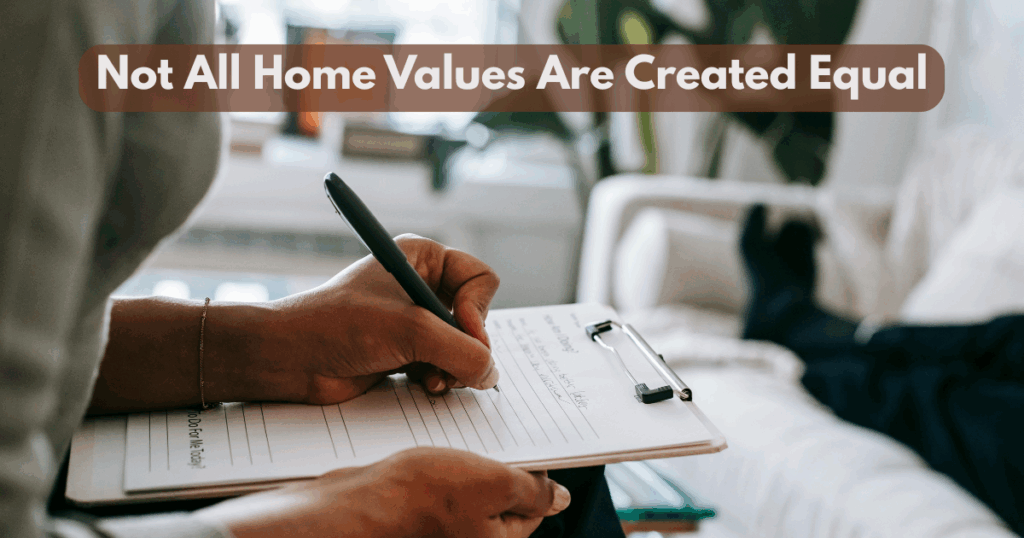Replacement Cost vs. Actual Cash Value vs. Market Value: What’s the Real Value of Your Home Insurance? | Blog | Vargas & Vargas Insurance

You just bought your home for $675,000—so why is your insurance company saying it’s only worth $450,000?
Are they undervaluing your biggest investment, or is there something more going on?
This article will break down the three key values that determine how your home is insured: replacement cost, actual cash value, and market value —and why understanding the difference could save you thousands.
We’ll explain what each term really means, how it impacts your coverage, and how to choose the right approach for your situation.
What Is Replacement Cost Value?
Replacement cost value (RCV) refers to what it would cost to rebuild your home from the ground up , using the same materials and craftsmanship, at today’s prices.
Unlike market value, it has nothing to do with what your home could sell for — it’s about what it would cost to reconstruct it after a covered loss (like a fire or severe storm).
Example:
Let’s say your home outside Boston has custom hardwood floors, marble countertops, and detailed millwork. To rebuild it with those features today, construction might cost $450,000 , even if the market says the home is worth $675,000. That’s because insurance only covers what it takes to replace the structure , not the land, location, or market demand.
📌 Important: Building costs have surged. Between 2018 and 2021, the average cost to build a single-family home rose 42% , according to NAR. That’s why replacement cost gets recalculated regularly.
What Is Actual Cash Value?
Actual cash value (ACV) is what your home (or parts of it) are worth today , accounting for depreciation over time. In other words, it’s replacement cost minus depreciation .
This type of policy pays out less because it reflects the home’s reduced value due to age, wear and tear, and outdated features.
Example:
If your home was built 10 years ago for $400,000, and its components have depreciated by 30%, your actual cash value might be around $280,000 . That’s all you’d receive from your insurance company if your home were destroyed — even if rebuilding it would cost much more.
⚠️ Actual cash value = lower premium, but higher out-of-pocket risk in a major loss.
What Is Market Value?
Market value is the amount your home would sell for in the current real estate market — including the value of the land, location, school district, and overall demand in your area.
Unlike insurance valuation, market value is heavily influenced by buyer demand, interest rates, and neighborhood factors.
Example:
A three-bedroom home in Dorchester might sell for $675,000, while a similar home in Brookline could go for $900,000 — even if they cost the same to rebuild. That’s market value at work.
💡 Your insurance company doesn’t cover market value , because they don’t insure the land — only the cost to replace the structure.
So Which Value Matters for Your Home Insurance?
For all homeowners, replacement cost value is the smartest and safest choice . It ensures you can rebuild your home as it was — without coming up short after a loss.
But not all policies are created equal. Some companies still offer actual cash value policies (especially on older homes or second properties), so it’s crucial to understand what you’re buying.
Here’s the updated Pro Tip section with the more nuanced cost breakdown included, while keeping the tone and flow consistent with the rest of the article:
🛠️ Pro Tip: How to Estimate Your Home’s Replacement Cost
To get a ballpark estimate, multiply your home’s square footage by the average construction cost per square foot in your area — but make sure you’re comparing apples to apples.
- Tract Homes: The widely quoted $280 per square foot typically applies to tract homes — properties built in large developments using pre-designed plans and cost-saving construction methods.
- Custom Homes: If your home is custom-built with high-end finishes, unique layouts, or specialty materials, the cost to rebuild is often $350 per square foot or more in Massachusetts.
Example:
A 2,000-square-foot tract-style home might cost around $560,000
to rebuild.
But a 2,000-square-foot custom home
could easily run $700,000+
to replace.
📌 This is why it’s so important to review your policy with a broker who understands local building costs — not just market averages.
Work With the Right Insurance Partner
Choosing the right policy is only part of the equation — choosing the right insurance broker makes all the difference.
Unlike agents who only represent one company, independent brokers like Vargas & Vargas Insurance work with a wide range of top-rated insurers. We compare options side by side, explain every detail clearly, and help you update your policy as your needs change.
📞 Ready to Make Sure You’re Covered Correctly?
Don’t risk being underinsured when it matters most. Call Vargas & Vargas Insurance today at 617-298-0655 for a personalized, no-obligation quote.
We’ll help you understand exactly what your home is worth — and how to protect every inch of it.


